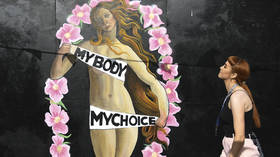Latvia's Human Rights and Public Affairs Commission approves ban of St. George's Ribbon, a hallmark of WWII victory celebrations

A commission of Latvia's parliament has approved a bill that would ban the use of the iconic St. George's ribbon during public events, with MPs believing it is a symbol of the Soviet era and is against the spirit of independence.
The measure, waved through by parliament's Human Rights and Public Affairs Commission this week, must be signed off by MPs before it passes into law.
The St. George's Ribbon is a black-and-orange-striped military symbol, which first appeared in 1769 as the ribbon of the Order of St. George, the highest military decoration of Imperial Russia. It regained prominence almost 200 years later, during World War II, when the same ribbon was used for the Soviet Order of Glory. Nowadays, the two colors are synonymous with the victory over Nazi Germany in 1945, and the ribbon is seen extensively during annual celebrations.
Also on rt.com Latvian military apologizes for GUNFIRE in busy streets of Riga which left civilians terrified amid major NATO war games (VIDEOS)According to the head of the commission, Artuss Kaimiņš, the values carried by the symbol are "unacceptable," also claiming that Russia's "totalitarian ideology towards the former Soviet republics" is a reason to reject the ribbon. Latvia has reason to see Moscow as a "threat to its democratic system and security," he said, according to Latvian publication Jauns.
Kaimiņš is a former actor and radio host who created his own right-wing political party in 2016. He was elected as an MP in 2018. Two years later, he was kicked out of the faction for alleged disloyalty to the party line.
In recent times, the black-and-orange ribbon has caused some controversy abroad, particularly in Ukraine and the Baltic states, where some believe it to be associated with Russian irredentism. It was banned in 2017 in Ukraine, with Kiev believing it to have become a symbol of the war in the country's east, which it blames on Moscow. Similar bans have also been discussed in Lithuania. Belarus has also moved away from the symbol, instead changing to a red and green ribbon.
Also on rt.com Annual Latvian march commemorating WWII SS troops that fought alongside Nazis against Soviet Union cancelled… because of Covid-19Think your friends would be interested? Share this story!













